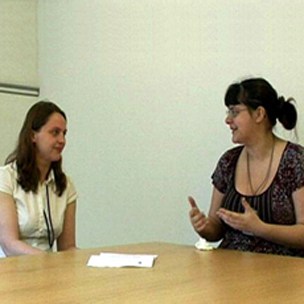‘You need to be able to make others feel confident in the results which you present.’
Job Title: JK – Crime Analyst
Qualifications: J.K – BA Mathematics & Philosophy, MSc Operational Research
Organisation: The Home Office
Jo Keefe and Katherine Byrne work for The Home Office and use a branch of Mathematics called Operational Research (O.R.) to help with a wide range of areas within the government.
What did you enjoy about Mathematics at school?
Jo : I always loved Maths, particularly problem solving. I think there is something exciting about understanding a problem and working hard to solve it.
Katherine : My appreciation for Maths has come with time. I’m not sure that I loved Maths very much early on at school and every year I didn’t think I would be taking more Maths. However thankfully I did and it has kept me very well equipped for the real world.
Can you tell me about your job history?
J : I was approaching the end of my Maths degree and wondering what on earth to do with it so I did a career questionnaire and it pointed me towards “Operational Research” (OR). I was not sure what this meant but upon further investigation I found out that it involves lots of problem solving and logical thinking and I thought “that’s it!”. I did my Masters in Operational Research and started applying for jobs.
K : My route was a bit different. I thought I might go into industry but I found my way into OR.
Can you tell me about some of the typical tasks in your work?
K : For example, this week I am using Excel to model manned gates compared with automated gates at passport control and learning about some new statistical analysis software.
J : One of my recent projects was concerned with Cost System Modelling. In this project I investigated how different parts of the Home Office connect.
What skills do you use in your job?
J : You need to have a good ability to communicate ideas to others who maybe have not touched Maths in a very long time. I also think good leadership is required in my specific role. I manage a team and guiding each project through requires a lot of organisational skills.
K : You need to be able to make others feel confident in the result you are presenting. I think you also need the ability to learn new things fairly quickly
What challenges do you encounter in your work?
J : Sometimes there is a bit of misunderstanding about the results which we obtain. Occasionally, the people we present results to want a “crystal ball” which will predict the future in exact terms. Our task is often to warn them that these results often give the solution to a problem within certain constraints and subject to several variables. A change in any of these can deliver different conclusions.
K : I think it’s also important to understand that for a reliable and good analysis, some adequate notice has to be given. Occasionally colleagues will realise that they need some analysis to add to a report so they call on the “numbers people” to add some numbers to it. Of course, it’s not as simple as that.
How does someone see O.R. in school Maths?
J : I think the coursework element of school Maths is a good indicator of how O.R. works in real life. We start out with a vague problem; we gather data and other information; we start analysing the problem, and then we present our findings.
K : I think it is that logic and problem solving element which is key and less so specific techniques.
What are some of your hobbies in your spare time?
K : I play the violin in an orchestra and I like to run. I’m training for the London 10k at the moment. I also do Tango lessons.
J : I like to do puzzles and any fun things that also stretch the mind really.






